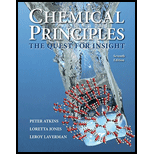
Concept explainers
(a)
Interpretation:
Shapes of
Concept Introduction:
Valence shell electron pair repulsion theory or VSEPR model is used to determine geometry of molecules. This is done with help of number of electron pairs that are present around central atom. According to this model, electron groups are arranged in such manner that minimizes repulsion with other electrons.
(b)
Interpretation:
Shapes of
Concept Introduction:
Refer to part (a).
(c)
Interpretation:
Shapes of
Concept Introduction:
Refer to part (a).
Want to see the full answer?
Check out a sample textbook solution
Chapter 3 Solutions
Chemical Principles: The Quest for Insight
- (a) What are the C¬C¬C bond angles in diamond?(b) What are they in graphite (in one sheet)? (c) Whatatomic orbitals are involved in the stacking of graphitesheets with each other?arrow_forwardThe binary hydrogen compounds of the Group 4A elements and their boiling points are: CH4, –162ºC; SiH4, –112ºC; GeH4, –88ºC; and SnH4, –52ºC. Explain the increase in boiling points from CH4 to SnH4.arrow_forward12 Calculate the density of a metal (in g cm3 with two decimal places) that has the energy of vacancy formation of 50.1 kJ mol 1 and equilibrium number of vacancies of 1.70 × 1026 vacancies m3 at 700 °C. The atomic weight is given as 52.00 g mol-¹. Gas constant = 8.314 J mol-1 K-1. Avogadro's number = 6.022 x 1023 atoms mol-1. Type your answer...arrow_forward
- Explain for these observations: (a) The surface tension of CHBr3 is greater than that of CHCl3. (b) As temperature increases, oil flows faster through a narrow tube. (c) Raindrops that collect on a waxed automobile hood take on a nearly spherical shape.arrow_forwardAt room temperature, monoclinic sulfur has the unit-cell dimensions a = 11.04 Å, b = 10.98 Å, c = 10.92 Å, and B = 96.73°. Each cell contains 48 atoms of sulfur. (a) Explain why it is not necessary to give the values of the angles a and y in this cell. (b) Compute the density of monoclinic sulfur (in g cm¯³).arrow_forwardWhich type of intermolecular force accounts for each ofthese differences? (a) CH3OH boils at 65 °C; CH3SH boils at6 °C. (b) Xe is a liquid at atmospheric pressure and 120 K,whereas Ar is a gas under the same conditions. (c) Kr,atomic weight 84 amu, boils at 120.9 K, whereas Cl2, molecularweight about 71 amu, boils at 238 K. (d) Acetone boilsat 56 °C, whereas 2-methylpropane boils at -12 °C.arrow_forward
- 1) (a) what is meant by the term polarizability? (b) Which of the following atoms would you expect to be most polarizable: O, S, Se, or Te? Explain. (c) Put the following molecules in order of increasing polarizability: GeCl4, CH4, SiCl4, SiH4, and GeBr4. (d) Predict the order of boiling points of the substances in part (c).arrow_forwardNeon and HF have approximately the same molecular mass. (a) Explain why the boiling point of Neon and HF differ. (b) Compare the change in the boiling points of Ne, Ar, Kr, and Xe with the change of the boiling points of HF, HCl, HBr, and HI, and explain the difference between the changes with increasing atomic or molecular mass.arrow_forwardHow many sigma bonds are formed during the course of the following reaction? C 18H 37OH+270 2(g) →18CO 2(g) +19H2O(l) sigma bonds.arrow_forward
- Gallium has an orthorhombic structure, with a0 = 0.45258 nm, b0 = 0.45186 nm, and c0 = 0.76570 nm. The atomic radius is 0.1218 nm. The density is 5.904 g cm3, and the atomic weight is 69.72 g mol. Determine (a) the number of atoms in each unit cell; and (b) the packing factor in the unit cell.arrow_forwardWrite the difference between ferromagnetism and anti-ferromagnetism.arrow_forwardCrystal structure represents the manner in which atoms or ions are arrayed in space. It is defined in terms of the unit celI (1) and the atom (2) within the unit cell. (1) = direction, (2) = sizes. (1) = plane, (2) = positions. (1) = geometry, (2) = positions. (1) = geometry, (2) = sizes.arrow_forward
 Introduction to General, Organic and BiochemistryChemistryISBN:9781285869759Author:Frederick A. Bettelheim, William H. Brown, Mary K. Campbell, Shawn O. Farrell, Omar TorresPublisher:Cengage Learning
Introduction to General, Organic and BiochemistryChemistryISBN:9781285869759Author:Frederick A. Bettelheim, William H. Brown, Mary K. Campbell, Shawn O. Farrell, Omar TorresPublisher:Cengage Learning Chemistry for Engineering StudentsChemistryISBN:9781337398909Author:Lawrence S. Brown, Tom HolmePublisher:Cengage Learning
Chemistry for Engineering StudentsChemistryISBN:9781337398909Author:Lawrence S. Brown, Tom HolmePublisher:Cengage Learning

